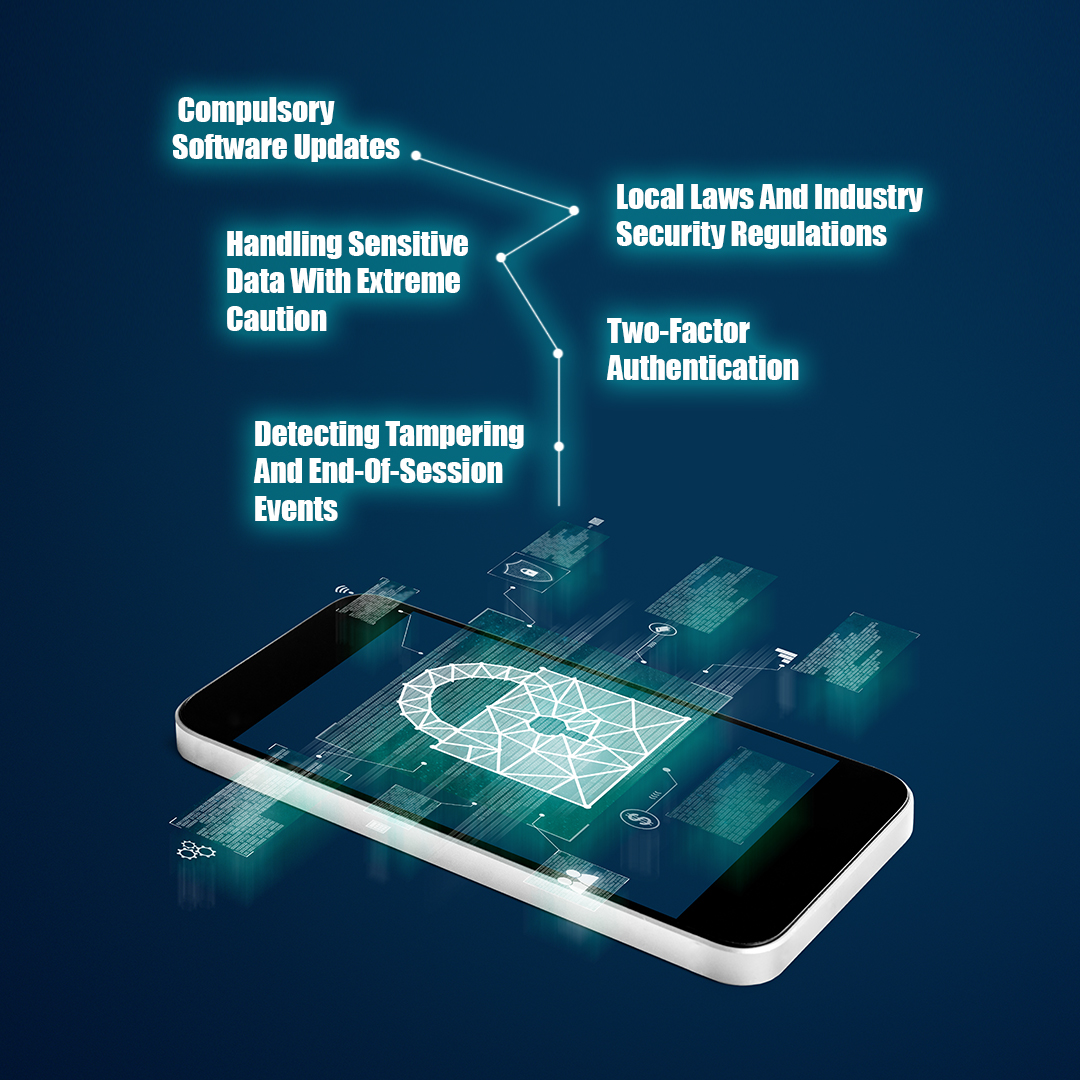Mobile Application Security: Definition, Practices, and Benefits
One of the most important parts of current software development is mobile application security. The reason for this is self-evident: mobile devices have become an inseparable part of our daily life. They include a wealth of personal information, such as pictures, email and social media account access, payment information, and so on to fortify app security.
As a result, mobile app developers must take considerable precautions and mobile app security practices to safeguard such information.
It entails evaluating programs for security flaws in the settings of the platforms on which they are intended to operate, the frameworks with which they are built, and the intended group of users or target audience. Mobile applications are an important aspect of a company's online presence, and many companies rely exclusively on them to communicate with people all over the world. By implementing the latest mobile app security measures global organizations can harness a super load of benefits of mobile app security.
The best app security best practices/measures protect user information, hardware, software, and more from illegitimate hacker activists. And for this, you need the strong industry expertise of a credible mobile app development company.
So now that we’re through with an intro, here’s everything you need to know about mobile application security.
Mobile Application Security - Definition
App security refers to a specific set of procedures, standards, and practices in the context of mobile apps. Some of them are general and applicable to all devices and apps. Others are made particularly for mobile devices and highlight their distinguishing qualities, such as the existence of cameras, different sensors, GPS, and so on. Mobile app security practices protect both hardware and software against illegal access, data theft, and other dangers.
A Few of the Most Major Mobile Application Security Threats
Given the significance and extremely sensitive nature of data on mobile devices, it is crucial to make use of the benefits of mobile app security. This is because smartphones have become a top target for a mixed bag of data thieves.
Nowadays, cell phones are frequently less important than the information they provide. Even when mobile devices are switched off or set aside, mobile platforms often retain users enrolled in their accounts. Most mobile programs loaded on smartphones or tablets, such as email and social network clients, messengers, streaming or shopping apps, and so on, fall under this category.

If a criminal is successful in cracking a password on a stolen device it means that a compromised set of mobile app security measures were implemented. Sensitive data might be used to steal the owner's identity or merely to blackmail, destroy their reputation, or empty their financial accounts. When a person loses their mobile device and a finder wishes to keep it, a similar situation arises. Furthermore, even when the mobile device is not present, the information may be stolen: a rogue software application may discreetly convey confidential data to a hacker.
Engineers classify threats into numerous categories based on their origin or goal. One of the fundamental categories in app security best practices, for example, includes passive and aggressive threats.
Passive threats are mobile application security flaws in an app or operating system's code. They are potential entry points for a hacker to undertake destructive acts. For instance, if an application delivers data without encryption or employs an out-of-date security protocol, it may pose a danger.
Active threats are tools in the armory of a hacker. Malware, spyware, viruses, phishing websites, and scripts are just a few of the tools used to aggressively break mobile app security and steal data. They might masquerade as legitimate applications or websites, or they can remain hidden on devices for months, leaking sensitive data.
The Primary Benefits of Mobile App Security
Given the significance of personal data, mobile app developers go to considerable lengths to ensure the security of their products. The utilization of mobile app security practices/standards improves the protection of user data. This, in turn, provides several advantages, some of which are described below.
1. Improved Identity Theft Protection
Stealing someone's digital identity entails obtaining digital copies of identifying papers, a social security number, passwords to vital accounts, and other forms of verification. All this information may be retrieved from a person's mobile device, for example, by inspecting internal and cloud storages or by avoiding two-step verification by utilizing the victim's phone number. Mobile apps created and tested in accordance with the most recent mobile app security measures/standards have special safeguards in place to prevent this from happening.
2. Banking Data Is More Secure
Many mobile applications that give access to products and services save payment information such as credit card numbers, delivery addresses, order lists, and so on. So, if a software client of your favorite cab service, fast food business, or online store has security issues, it might possibly expose this personal information. Quality assurance and app security best practices/measures that are appropriate reduce such hazards.
3. Greater Resilience To Big Infrastructure Breaches

Several large-scale cyber breaches in multinational organizations over the previous decade have resulted in the theft of millions, if not billions, of data records. Such massive databases are typically sold on the Darknet, leading to smaller, more tailored attacks, most likely scamming, phishing, and so on.
Generally, organizations are hesitant to disclose that such breaches occur, thus consumers may be unaware that their data has been hacked and their privacy is in jeopardy for some time.
Again, software created and maintained in accordance with security standards has a significantly better chance of preventing data leaking during such huge occurrences along with other benefits of mobile app security.
4. Personal Media And Messages Are Safer
Users often maintain a large number of personal images and videos on their mobile devices or in cloud storage accessible from those devices. If such video media comes into the wrong hands, it might be exploited for extortion or to disgrace people just for the sake of embarrassment. Similarly, communications in current mobile applications might take the form of photographs, videos, or text. Personal communication is encrypted, and media files are shielded from outsiders, thanks to mobile app security.
5. Enhanced Security Against Hardware Hijacking
As mobile devices get more complex, they gain better sensors and processors, as well as strong AI functions. If someone controls them remotely, they become huge espionage instruments. They are capable of recording and transmitting audio and video data, as well as current geolocation and other information about the device's surroundings.
Furthermore, malware-infected mobile devices may become part of a botnet, which may be utilized for a variety of harmful reasons ranging from spamming to DDoS assaults. During the Bitcoin mania, smartphones and tablets were utilized for mining, however, this trend has diminished but has not totally vanished.

Mobile application security guarantees that software can successfully defend against assaults and detect infected files or harmful URLs in order to warn users ahead of time.
Ultimately, security in mobile app development seeks to protect users' data and devices from all forms of attacks. Users would choose a mobile application that adheres to contemporary app security measures over other similar solutions that are old or have known security issues. A secure mobile app is far more enticing since it meets one of the most fundamental human needs: people want to feel protected not just physically, but also in terms of their privacy and cash.
Mobile App Security Practices for Improving App Security

Mobile app security practices are a never-ending race. Hackers' tactics and tools have gotten more sophisticated, and security solutions must keep up. The software development community has embraced such measures, which include specific standards and methodologies for organizing the development process. So, following current rules and meeting standard criteria is the best method to assure the safety of a mobile app.
A large number of benefits of mobile app security and criteria indicates that the standard is quite stringent. Developers must devote a significant amount of time and effort to meet all criteria and optimize the security of their mobile applications.
So, following current rules and meeting standard criteria is the best method to assure the safety of a mobile app.
A large number of benefits of mobile app security and criteria indicate that the standard is quite stringent. Developers must devote a significant amount of time and effort to meet all criteria and optimize the security of their mobile applications. In general, it is preferable, to begin with a few key changes that have a significant impact on security, such as the following:
1. Compulsory Software Updates
The majority of mobile app updates nowadays focus on improving security rather than adding new functionality. A vulnerable application is one that is out of date. It is the developers' responsibility to keep an app secure with updates or patches using mobile app security measures and to provide them to user devices as soon as possible.
2. Ensure That An Application Conforms With Local Laws And Industry Security Regulations
It is common policy to keep consumers' data on servers in their respective states with app security best practices. This means that no country should store the personal information of individuals from other countries.
3. Make Sure That An Application Handles Sensitive Data With Extreme Caution
To begin with, it entails adopting encryption and secure methods while communicating such information. By default, an app's user interface should conceal confidential information like passwords or PIN numbers. Sharing such data with outside parties should be absolutely restricted with mobile application security, unless required by app architecture. There must be no logging of personal information. Sensitive data must be encrypted and stored in a "sandbox" within the app, ideally remotely.
4. Set Up Two-Factor Authentication
For good reason, combining two separate forms of authentication has become a de-facto security standard. A password plus an SMS code, or a biometric scan, such as a fingerprint or face scan, and a PIN code, are among the most common mobile device combinations in-app security.
5. Ensure That An Application Can Detect Tampering And End-Of-Session Events
An app must lock and restrict any further attempts to break in after a predefined number of unsuccessful authentications. An application must also "log out" a user after a defined amount of inactivity.
Top-tier mobile app security practices are attainable with professional QA methods and extensive security testing.
The way it's done is challenging, but the defined standard and checklist make it quite less stressful.
Mobile Application Security, All the Way!
It is critical to ensure the security of mobile apps using mobile application security measures. As a result, it should be allocated to qualified engineers with the necessary experience and testing tools. Employing professionals who work in well-coordinated teams to provide a wide range of mobile app development services can help you with that. They have thorough testing and maintenance of the highest quality and security requirements throughout the development life cycle. So make sure you partner with such mobile application security experts to have a powerful advantage.


